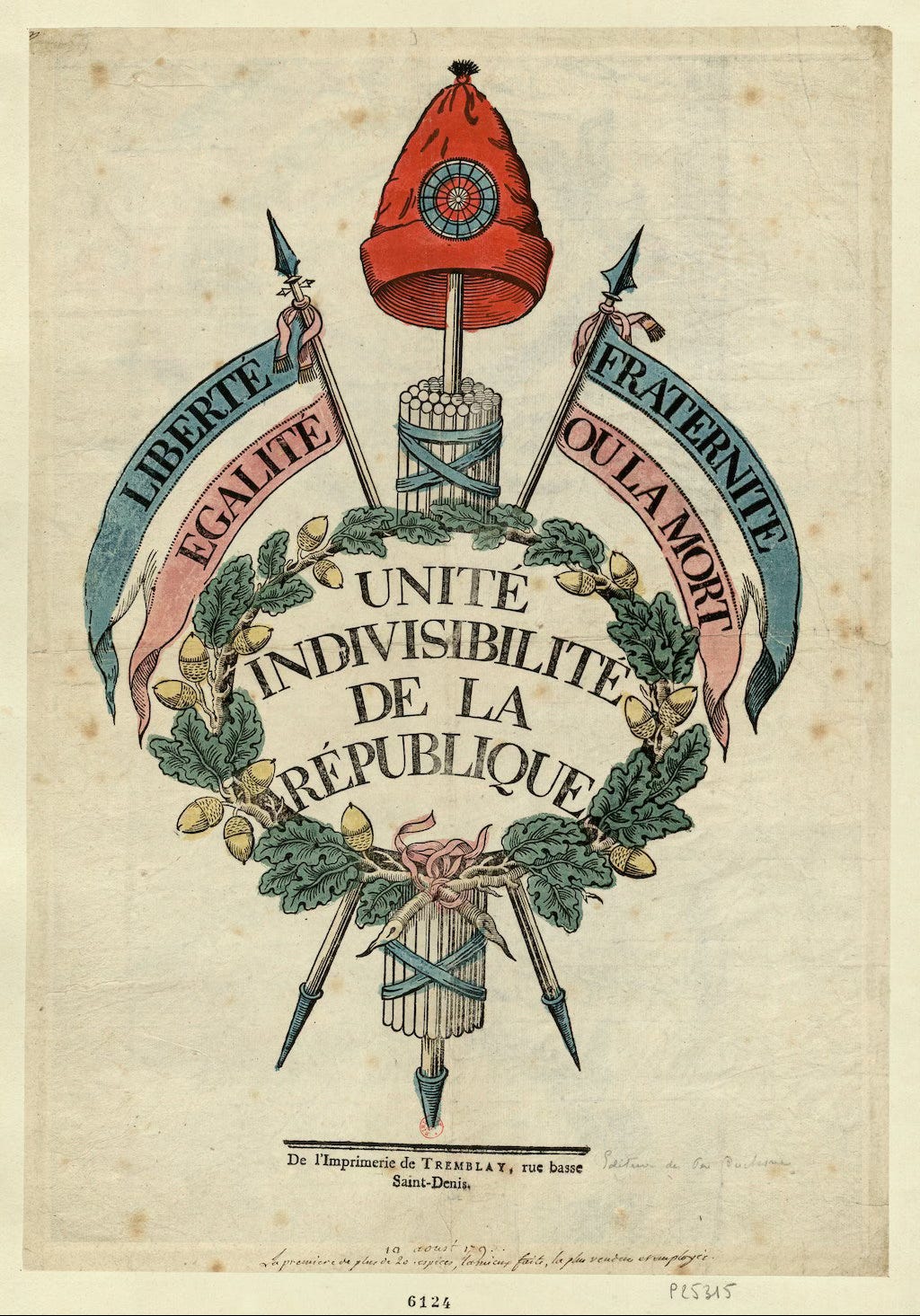The French love rules. Love rules. They have a process for everything in public and probably all aspects of private life. They follow the rules, and they really have no respect, time nor affection for those who do not. Everyone is polite, it’s a simple sign of mutual respect. Saying ‘Bonjour’ to every single person in a shop in a small town, saying ‘Bonjour’ before you ask someone a question at the station or on the street, saying ‘Au revoir’ when you leave a place; they all signify that the other people are human like you, and deserve the basic respect. This is the Egalité in action.
The Liberté is limited in so far as one is free to do what you like, say what you want, as long as it hurts no-one and remember that it is but the first word in the Liberte, Egalite, Fraternite trifecta. The liberty, equality and brotherhood of the motto of the Republic are not taken as separate beliefs but in the power of their combination. So no semi-automatic rifles here; religious freedom does not mean one’s beliefs supersedes those of the state or, as of yesterday, the ability to remove a woman’s inalienable right to decide for herself whether she brings another life into the world.
They also take the small rules seriously. We have the recycling picked up three days a week, today the Music School from the Université de Lyon next door had overstuffed their large recycle bin. The binmen or ‘les ébouers’, took offense and taped over the bursting dumpster lid with red tape, declaring it was non-conforming and left it behind. We have a compost bin on most blocks now, in an effort to get the methane creating organic waste out of the landfills. They distributed to every household a little brown compost bin and a 120-day supply of brown paper bags which get thrown into the larger bin out front. Someone obviously didn’t read the rules and threw something they were not supposed to in it, and we had our compost bin taped shut for 2 weeks, as a punishment for depositing “non-conforming waste”.

I think the French approach to rules is refreshing, especially if your reference points like me are either England, where no one gives a shit for the rules or the US where they have a blind obsession for the rules even if they make no sense (pick your own personal amendment). The French had got sick of the hierarchical aristocratic system overseen by the King and the system of privileges for the guilds and the church. They had themselves a revolution in 1789 and threw all that out over a period of 10 years. They decided that the people were better at ruling themselves than having to listen to someone who happened to be born in a certain place to certain other people and so in 1793 cut off the King’s head to prove, amongst many things, that he most certainly was not divine. The practical difficulties of this degree of self-determination and the struggle for political control was demonstrated over the ensuing further 6 years of chaos starting with the Reign of Terror, under the ironically named National Convention to the Committee of Public Safety. It was not safe for the 16,000 members of the public who were executed in about 9 months. They had two further changes of power, and the Republic which had been so proudly and vehemently celebrated in 1792 gave way to the Directory. The French do love a good bureaucracy and two key the things that struck me reading “Citizens!” by Simon Schama (the best single volume history of the Revolution, even if a bit weighty) was that firstly, during all this 10 years of absolute chaos, France was embroiled in near constant wars, Prussia, Spain, Austria and good old Blighty shit-stirring from the sidelines, all had a go at settling scores with France. Secondly, they tried desperately to have an enlightened democracy and formed one after another of various forms of representations, taking lands and trade monopolies from one part of the society to try and give to others to equalize the country. They formed different lower and upper houses, localized representative assemblies, centralized budget forming bodies and one after another failed to unify the country. So they would start again, a few people would be executed and someone else got to try their idea until that failed, and they found themselves facing the guillotine. Finally, the Directory gave way to the Consulate, one of whom was Napoleon Bonaparte, and the rest as they say is history. As much as Boney gets grief now for restoring slavery and his warmongering, the France of today owes much to his administrative changes and rules which settled France into the 19th century power house that it became.
The French follow the rules religiously as long as they are seen as being applied equally and making sense. When they do not, they burn shit down. The spirit of the Revolution definitely lives on in that aspect of life in France. Since we have lived in France full-time we have had the ‘Gilets Jaune’ movement, ignited by protests against changes to rules around car emissions which punished the rural poor. We have had the concerted efforts by the French Unions to block arguably much needed reform of the sprawling pension system, because it punished the working poor. This became more of a fight about modern capitalism, and we enjoyed hearing the smashing of cars, shop windows and the smell of burning trash cans and bus shelters off and on for 3 months just around the corner. We have had the farmers blockading the major freeways and donating supplies of old tires and manure to local government offices. In each case there is a general support for the plight of the victim of the bad rules, the hardworking Everyman, suffering at the hands of an unseen bureaucrat in Paris or Brussels.
Wednesday was the day of St Colette. You may be surprised to read that as much as the French do like the writings of Colette and that she was honored by the state and buried in Père-Lachaise, the Catholic Church found her ‘sulpherous’ and refused her a church burial, so they would be pushed to beatify her. St Colette was a woman born in the late 14th century who found the normal life of a nun in an abbey too comfy and so started a new order that prescribed extreme poverty, going barefoot, and the observance of perpetual fasting and abstinence. The supposed anti-pope at the time in Avignon gave her his blessings and issued papal bulls to support her mission, and she managed to persuade enough other women that this was the life for them that she opened up 18 monasteries under her regime. This probably tells you more about how much fun normal life for women was in the late 15th century in rural France. As much as you may be being introduced to St Colette just now, she is known more widely than you would think as she is the Catholic version of IVF. Her mother gave birth to her at the age of 60, so not unsurprisingly she is patron saint of women seeking to conceive, expectant mothers, and sick children.
Wednesday’s lunch was postponed to Thursday due to what could best be summarized as a phone panic. When you lose a phone with all those great banking apps, business apps and documents accessible that you would not want anyone having access to, it’s not conducive to a relaxing lunch. When your 2-factor auth is only available on that phone which would normally allow you to change passwords, it pisses you off for the rest of your whole day for sure. If you happen to have your American SIM card as an E-SIM in the same phone, and you realize you would have to fly to the US to restart service, on which all your US banking 2-factor auths depend, it would ruin your week.
Hosanna! The Joy of Relocating Previously Lost Phone!
